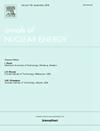解读核能和可再生能源消费的环境作用:时间-频率视角
IF 2.3
3区 工程技术
Q1 NUCLEAR SCIENCE & TECHNOLOGY
引用次数: 0
摘要
利用核能和可再生能源为减少温室气体排放、打破对化石燃料的依赖、确保稳定、低碳的能源供应、实现持久的生态平衡提供了一条强有力的途径。因此,这项研究开创了对温室气体排放及其关键驱动因素(特别是美国的核能和可再生能源消耗)之间的时频关联的调查。此外,该研究还使用1970年第一季度至2023年第四季度的数据考察了社会全球化和经济增长的作用。据作者所知,这是第一次通过小波方法来探索这种联系的实证研究。结果表明,在不同的时间频率上,温室气体与社会全球化呈负相关,与可再生能源呈负相关,与核能呈负相关。基于这些结果,本研究制定了协调一致的政策方针。本文章由计算机程序翻译,如有差异,请以英文原文为准。
Decoding the environmental role of nuclear and renewable energy consumption: A time-frequency perspective
Harnessing nuclear and renewable energy offers a powerful pathway to slash greenhouse gas emissions (GHGS), break fossil fuel dependence, and secure a stable, low-carbon energy supply for enduring ecological balance. Thus, this study pioneers an investigation into the time–frequency association between greenhouse gas emissions and its key drivers, specifically nuclear energy and renewable energy consumption in the United States. Additionally, the study examines the role of social globalization and economic growth using data from 1970:Q1 to 2023:Q4. To the best of the authors’ knowledge, this is the first empirical study to explore this connection through wavelet methods. The findings reveal that, across various time frequencies, GHGS and social globalization are negatively correlated, GHGS and renewable energy are negatively correlated, and GHGS and nuclear energy are negatively correlated. Based on these results, the study formulates a coordinated policy approach.
求助全文
通过发布文献求助,成功后即可免费获取论文全文。
去求助
来源期刊

Annals of Nuclear Energy
工程技术-核科学技术
CiteScore
4.30
自引率
21.10%
发文量
632
审稿时长
7.3 months
期刊介绍:
Annals of Nuclear Energy provides an international medium for the communication of original research, ideas and developments in all areas of the field of nuclear energy science and technology. Its scope embraces nuclear fuel reserves, fuel cycles and cost, materials, processing, system and component technology (fission only), design and optimization, direct conversion of nuclear energy sources, environmental control, reactor physics, heat transfer and fluid dynamics, structural analysis, fuel management, future developments, nuclear fuel and safety, nuclear aerosol, neutron physics, computer technology (both software and hardware), risk assessment, radioactive waste disposal and reactor thermal hydraulics. Papers submitted to Annals need to demonstrate a clear link to nuclear power generation/nuclear engineering. Papers which deal with pure nuclear physics, pure health physics, imaging, or attenuation and shielding properties of concretes and various geological materials are not within the scope of the journal. Also, papers that deal with policy or economics are not within the scope of the journal.
 求助内容:
求助内容: 应助结果提醒方式:
应助结果提醒方式:


